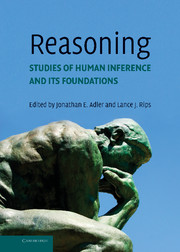Book contents
- Frontmatter
- Contents
- Preface
- List of Contributors
- Introduction: Philosophical Foundations
- PART I FOUNDATIONS OF REASONING
- PART II MODES OF REASONING
- Section 3 Deductive Reasoning
- 9 Logical Approaches to Human Deductive Reasoning
- 10 Mental Models and Deductive Reasoning
- 11 Interpretation, Representation, and Deductive Reasoning
- 12 Reasoning with Quantifiers
- 13 The Problem of Deduction
- Section 4 Induction
- Section 5 Dual and Integrative Approaches
- Section 6 Abduction and Belief Change
- Section 7 Causal and Counterfactual Reasoning
- Section 8 Argumentation
- PART II INTERACTIONS OF REASONING IN HUMAN THOUGHT
- Index
- References
13 - The Problem of Deduction
Published online by Cambridge University Press: 05 June 2012
- Frontmatter
- Contents
- Preface
- List of Contributors
- Introduction: Philosophical Foundations
- PART I FOUNDATIONS OF REASONING
- PART II MODES OF REASONING
- Section 3 Deductive Reasoning
- 9 Logical Approaches to Human Deductive Reasoning
- 10 Mental Models and Deductive Reasoning
- 11 Interpretation, Representation, and Deductive Reasoning
- 12 Reasoning with Quantifiers
- 13 The Problem of Deduction
- Section 4 Induction
- Section 5 Dual and Integrative Approaches
- Section 6 Abduction and Belief Change
- Section 7 Causal and Counterfactual Reasoning
- Section 8 Argumentation
- PART II INTERACTIONS OF REASONING IN HUMAN THOUGHT
- Index
- References
Summary
Our main concern is not with the explanation of rational action generally but with the particular cluster of rational activities which are directed toward answering the questions about the way the world is. Engaging in inquiry is of course itself a form of rational behavior and the pragmatic picture implies that such behavior should be explained according to the same belief-desire pattern as the naive, unreflective behavior of dogs and children. But in order to treat the special problems that arise in explaining those actions which explicitly concern the evaluation and modification of the agent's beliefs, we need a more specialized apparatus designed to describe that specific kind of activity. We need to be able to talk about an agent's beliefs about his beliefs, about the form in which his beliefs are expressed, and about the ways in which his beliefs may change in response to his experience.
The concept of acceptance will be a central concept in the account of inquiry developed here. Acceptance, as I shall use this term, is a broader concept than belief; it is a generic propositional attitude concept with such notions as presupposing, presuming, postulating, positing, assuming and supposing as well as believing falling under it. Acceptance is a technical term: claims I make about acceptance are not intended as part of an analysis of a term from common usage. But I do want to claim that this technical term picks out a natural class of propositional attitudes about which one can usefully generalize.
- Type
- Chapter
- Information
- ReasoningStudies of Human Inference and its Foundations, pp. 269 - 281Publisher: Cambridge University PressPrint publication year: 2008

